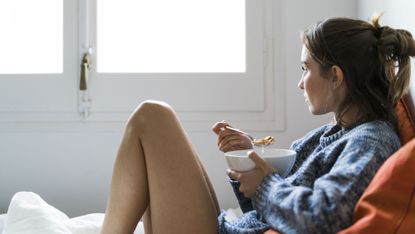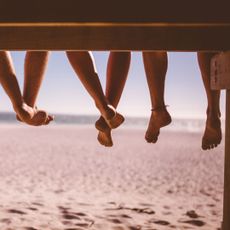How a young ovarian cancer survivor lives without fear
Primary school teacher Laura Moss opens up to Marie Claire about her ovarian cancer experience

Primary school teacher Laura Moss opens up to Marie Claire about her ovarian cancer experience
'I was 27 when I was diagnosed. It was diagnosed at stage 3. I had high-grade, serious ovarian cancer. It had spread – through my pelvis, my stomach glands, my peritoneum and it was on my liver.
I was working full time as a primary school teacher when I started experiencing ovarian cancer symptoms. There were little signs like I’d gone up a dress size and had some really bad periods. It started with cramps, then bloating, then I got completely constipated (I wasn’t going to the toilet at all), I was peeing for England, then the bloating just kept going and going and going until I had what looked like a pregnant belly. I had a bit of acid reflux and then awful pelvic pain, I couldn’t even sit down.
The Marsden were amazing, though. I was rushed in on a Friday night. Saturday, Sunday and Monday I had my fluid drained and a biopsy. Monday I was discharged. I was back on Thursday for the results and on Monday I started chemo.
How did you feel about having ovarian cancer at such a young age?
I was very angry, very very angry and it took me a long time to let that go. The problem is that ovarian cancer symptoms mimic IBS symptoms and too many women, including me, are being sent down the gastroenterology route. They’re getting a late diagnosis because of their age – the key to survival here is early diagnosis.
The doctor explained that he got where my anger was coming from but ovarian cancer would have been the furthest thing from their minds because I was 27 – and that’s the problem isn’t it. My age led them not to think it was cancer.
What happened to your body after you were diagnosed?
I had my ovaries removed, my Fallopian tubes, my womb, my cervix. They cleared my pelvic area, they took away most of my diaphragm because it had spread there, too. My appendix is gone, one lymph node leading to my heart had to go – so it was a big surgery! I got left with a great whopping scar.
Marie Claire Newsletter
Celebrity news, beauty, fashion advice, and fascinating features, delivered straight to your inbox!
My family had also found out about the BRCA gene – I’m one of four, I have two sisters and a brother – and I was the only one who had inherited it. The oncologist told me was that although the BRCA gene had caused the cancer, the BRCA gene was the thing that was going to help me get rid of it. Someone with the BRCA1 gene responds better to chemotherapy. The thing that gave me the cancer was the thing that was going to help me through this. I found that really hard to get my head around.
What happened to your periods?
Before I got the diagnosis I used to get quite long periods; I used to think my period was over, but then I’d bleed a bit more. I remember I had some really bad ones but I never made anything of it. I don’t know now if that was related to the cancer.
It was aggressive. There was no time to mess around. There was no time to harvest any eggs. They had to just stop me from producing oestrogen. When I went into hospital and started the chemo, they shut my ovaries down so I stopped having periods from then. I went into a temporary menopause at the beginning of my treatment. I was constantly convinced I had a temperature but actually it turned out I was just having hot flushes!
How did you cope with chemotherapy?
I was very anxious at the beginning about losing my hair. I just flipped. I think it was because, in the space of a week, everything had literally been taken away from me. I just thought no, I don’t want someone to take my hair away, too. I wanted a little bit of control.
My oncologist told me that there was going to be nine weeks of intense chemotherapy and that it’ll be hard but that way we can try scalp-cooling (when you wear a helmet that freezes your scalp to about -5). I was young, I was very emotional, I was very vulnerable, I was very scared - but it worked well for me to know that every Monday, I was going to be in front of the chemo doctor and I was going to have a full check.
I kept my hair, I cut it short and it went very patchy towards the end, but at that point I didn’t care. As quickly as it left, it came back.
How did you cope emotionally?
I set up my blog Finding Cyril and have blogged every week since I was diagnosed because there was a lot of anger. I thought if it can happen to me, I can probably happen to loads of young girls. Very quickly I found them! I found girls that were even younger than me who had gone to the GP and their symptoms had been ignored because of their age. Connecting with these girls has helped me come to terms with it all.
My family and friends have been nothing short of incredible, too. One of my friends wrote a guest post for my blog, and she put a sentence about how it had been an emotional roller coaster, not just for me but for everyone who loves me and everyone around me. I think it was! When I called from friend from hospital and told them what happened, they were shell-shocked. As were my family.
Do you have any advice for women who are worried about ovarian cancer?
I feel so thankful that I knew I carried that BRCA1 gene because it made me more aware. I was conscious, even though there was a little part of me that felt uncomfortable carrying it, so I suggest getting checked! The Eve Appeal publish loads of things that explain the main symptoms to look out for, too. I would urge any woman who has those symptoms – age is irrelevant – to go to a GP and don’t take no for an answer.
How do you feel now you’re in remission?
I’ve been in remission since 16th November 2016, but little things set me off that wouldn’t have before, like tummy cramps. I had a lot of meltdowns after I came off the main chemo.
I lost sight of what was normal for a while because I was so scared. I’m scared because I know there is a risk of reoccurrence and I’ve met lots of women that has happened to, but I’m trying not to live in fear.
There are complications, too. Obviously, I won’t be able to have children which is sad. How that was taken away from me was quite cruel. But then, I’ve had enough role models in my life to know that you don’t have to give birth to a child to become a mum. I know that I am determined to stay healthy, I know that I will be a mum in some way, too. I don’t know how, but I will.
The leading destination for fashion, beauty, shopping and finger-on-the-pulse views on the latest issues. Marie Claire's travel content helps you delight in discovering new destinations around the globe, offering a unique – and sometimes unchartered – travel experience. From new hotel openings to the destinations tipped to take over our travel calendars, this iconic name has it covered.
-
 Trust me, tinted lip balms are the low maintenance way of adding a wash of colour without the stress - here are 7 of the best
Trust me, tinted lip balms are the low maintenance way of adding a wash of colour without the stress - here are 7 of the bestFrom affordable to luxe, these are the ones I love
By Tori Crowther
-
 Here's exactly how to get your feet sandal-ready in 6 simple steps, according to a nail tech
Here's exactly how to get your feet sandal-ready in 6 simple steps, according to a nail techThese are the products I rely on
By Tori Crowther
-
 With their Sunlit Clementine & Vetiver collection, Molton Brown has mastered the aroma of an endless summer
With their Sunlit Clementine & Vetiver collection, Molton Brown has mastered the aroma of an endless summerEscapism at its finest
By Shannon Lawlor